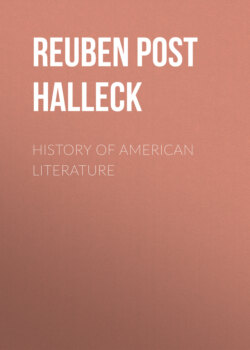Читать книгу History of American Literature - Reuben Post Halleck - Страница 32
На сайте Литреса книга снята с продажи.
JOHN WOOLMAN, 1720–1772
ОглавлениеA GREAT ALTRUIST.—This Quaker supplements Franklin in teaching that the great aim in life should be to grow more capable of seeing those spiritual realities which were before invisible. Life's most beautiful realities can never be seen with the physical eye. The Journal of John Woolman will help one to increase his range of vision for what is best worth seeing. It will broaden the reader's sympathies and develop a keener sense of responsibility for lessening the misery of the world and for protecting even the sparrow from falling. It will cultivate precisely that side of human nature which stands most in need of development. To emphasize these points, Charles Lamb said, "Get the writings of John Woolman by heart," and Whittier wrote of Woolman's Journal, which he edited and made easily accessible, "I have been awed and solemnized by the presence of a serene and beautiful spirit redeemed of the Lord from all selfishness, and I have been made thankful for the ability to recognize and the disposition to love him."
John Woolman was born of Quaker parentage in Northampton, New Jersey. He never received much education. Early in life he became a shopkeeper's clerk and then a tailor. This lack of early training and broad experience affects his writings, which are not remarkable for ease of expression or for imaginative reach; but their moral beauty and intensity more than counterbalance such deficiencies.
A part of his time he spent traveling as an itinerant preacher. He tried to get Quakers to give up their slaves, and he refused to write wills that bequeathed slaves. He pleaded for compassion for overworked oxen and horses. He journeyed among the Indians, and endeavored to improve their condition. It cut him to the quick to see traders try to intoxicate them so as to get their skins and furs for almost nothing. He took passage for England in the steerage, and learned the troubles of the sailors. From this voyage he never returned, but died in York in 1772.
In the year of his death, he made in his Journal the following entry, which is typical of his gentle, loving spirit:
"So great is the hurry in the spirit of this world, that in aiming to do business quickly and to gain wealth, the creation at this day doth loudly groan."
When a former president of Harvard issued a list of books for actual reading, he put Franklin's Autobiography first and John Woolman's Journal second. Franklin looked steadily at this world, Woolman at the next. Each record is supplementary to the other.
